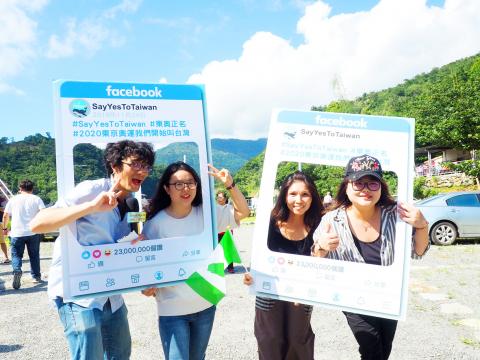The International Olympic Committee (IOC) has reiterated for the third time that it would not approve any change to the name of the Chinese Taipei Olympic Committee (CTOC), adding that the title was determined by an agreement signed in 1981 in Lausanne, Switzerland.
National Olympic Committee (NOC) Relations and Olympic Solidarity director Pere Miro sent a letter, dated Friday, to CTOC president Lin Hong-dow (林鴻道) and Sports Administration Director-General Kao Chin-hsung (高俊雄).
The nation on Saturday is to vote in a referendum that asks whether the name of the national team competing at the 2020 Tokyo Olympic Games should be changed from “Chinese Taipei” to “Taiwan.”

Photo: Wang Hsiu-ting, Taipei Times
The IOC Executive Board said in a letter in May that it would not allow the Taiwanese delegation to attend the Olympic Games under a different name.
Last month, it sent another letter to express its concern about the name-change referendum.
Unlike the first two letters, which were sent only to the CTOC, Friday’s letter was sent to the CTOC and the Sports Administration.
The letter said that the IOC does not interfere in local procedures and fully respects freedom of expression, but added that the committee was reiterating that the matter fell under its jurisdiction to avoid unnecessary expectations or speculation.
“The name of the Chinese Taipei Olympic Committee is determined by the agreement signed between the CTOC and the IOC in 1981, and any change to the name ... is subject to the approval of the IOC Executive Board, in accordance with the Olympic Charter,” the letter said.
The IOC said its executive board examined the matter at its May meeting and confirmed that it would not approve any name change.
The 1981 agreement remains unchanged and fully applicable, it said, adding that breaching the agreement or going against the executive board’s decision would expose the CTOC to corrective measures set out in the Olympic Charter.
The Sports Administration yesterday said that its priority is to protect the athletes’ right to compete internationally and ensure that CTOC membership in the IOC does not breach the Olympic Charter.

POSITIVE DEVELOPMENT: Japan and the US are expected to hold in-depth discussions on Taiwan-related issues during the meeting next month, Japanese sources said The holding of a Japan-US leaders’ meeting ahead of US President Donald Trump’s visit to China is positive news for Taiwan, former Japan-Taiwan Exchange Association representative Hiroyasu Izumi said yesterday. After the Liberal Democratic Party’s landslide victory in Japan’s House of Representatives election, Japanese Prime Minister Sanae Takaichi is scheduled to visit the US next month, where she is to meet with Trump ahead of the US president’s planned visit to China from March 31 to April 2 for a meeting with Chinese President Xi Jinping (習近平). Japan and the US are expected to hold in-depth discussions on Taiwan-related issues during the

‘LIKE-MINDED PARTNER’: Tako van Popta said it would be inappropriate to delay signing the deal with Taiwan because of China, adding he would promote the issue Canadian senators have stressed Taiwan’s importance for international trade and expressed enthusiasm for ensuring the Taiwan-Canada trade cooperation framework agreement is implemented this year. Representative to Canada Harry Tseng (曾厚仁) in an interview with the Central News Agency (CNA) said he was increasingly uneasy about Ottawa’s delays in signing the agreement, especially as Ottawa has warmed toward Beijing. There are “no negotiations left. Not only [is it] initialed, we have three versions of the text ready: English, French and Mandarin,” Tseng said. “That tells you how close we are to the final signature.” Tseng said that he hoped Canadian Prime Minister Mark Carney

President William Lai (賴清德) yesterday bestowed one of Taiwan’s highest honors on Saint Vincent and the Grenadines (SVG) Ambassador Andrea Clare Bowman in recognition of her contributions to bilateral ties. “By conferring the Order of Brilliant Star with Grand Cordon on Ambassador Bowman today, I want to sincerely thank her, on behalf of the Taiwanese people, for her outstanding contribution to deepening diplomatic ties between Taiwan and SVG,” Lai said at a ceremony held at the Presidential Office in Taipei. He noted that Bowman became SVG’s first ambassador to Taiwan in 2019 and

A man walks past elementary school artworks at the Taipei Lantern Festival in Ximen District yesterday, the first day of the event. The festival is to run from 5pm to 10pm through March 15.